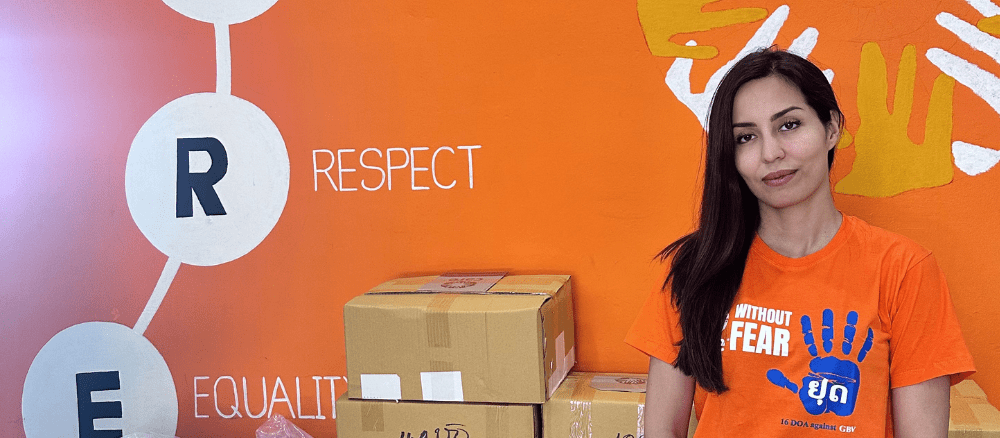#VETSVolunteerVoices aims to brings you stories of our passionate VETS program volunteers from the field. Meet Zainab Baqiri, a Climate Change Advisor who spent four months in Laos (August–November 2024) working with CARE to strengthen climate resilience and adaptation strategies for vulnerable communities.
From Climate Advocacy to Action
When I discovered the VETS program, I saw an opportunity to turn my commitment to climate justice into tangible impact. Climate change disproportionately affects the world’s most vulnerable populations—those who contribute the least to global emissions yet face the greatest risks. I've always felt personally called to help these communities adapt and build resilience. Working with CARE Laos – VWB's VETS program partner – allowed me to do just that.
As a Senior Advisor in CARE Laos’ Climate Change Adaptation and Disaster Risk Reduction unit, my focus was on empowering Lao women, particularly those from ethnic minority backgrounds, to navigate the challenges of climate change. I oversaw seven projects within the unit, provided strategic guidance, and developed capacity-building workshops tailored for CARE’s provincial staff, civil society partners, and government stakeholders.
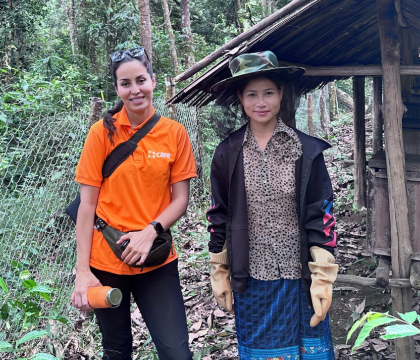 PHOTO: Zainab on a field visit in Phongsaly Province.
PHOTO: Zainab on a field visit in Phongsaly Province.
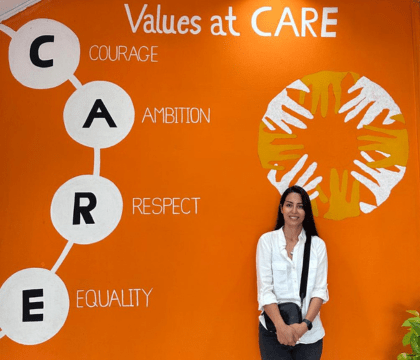 PHOTO: Zainab at the CARE office in Laos.
PHOTO: Zainab at the CARE office in Laos.
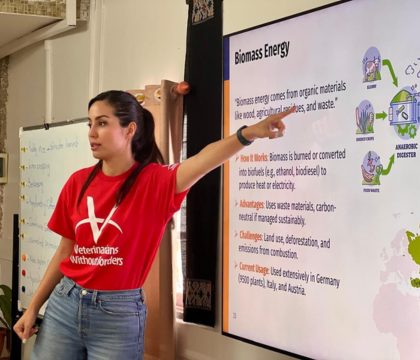 PHOTO: Zainab delivering training to CARE staff.
PHOTO: Zainab delivering training to CARE staff.
Strengthening Climate Resilience from the Ground Up
Climate resilience is about more than just implementing strategies—it’s about equipping communities with the knowledge and tools they need to sustain these efforts long after a project ends. In Laos, where agriculture and natural resources are the backbone of rural livelihoods, this approach was central to my work. However, while national climate action plans have evolved, translating these commitments into local action remains a challenge.
To support this process, I focused on strengthening climate-smart agriculture initiatives, training farmers and local leaders on climate adaptation strategies, and aligning CARE’s resilience efforts with Laos’ national climate policies. Beyond technical strategies, this work was about fostering a sense of ownership within communities, ensuring that adaptation efforts were both practical and sustainable for the long term.
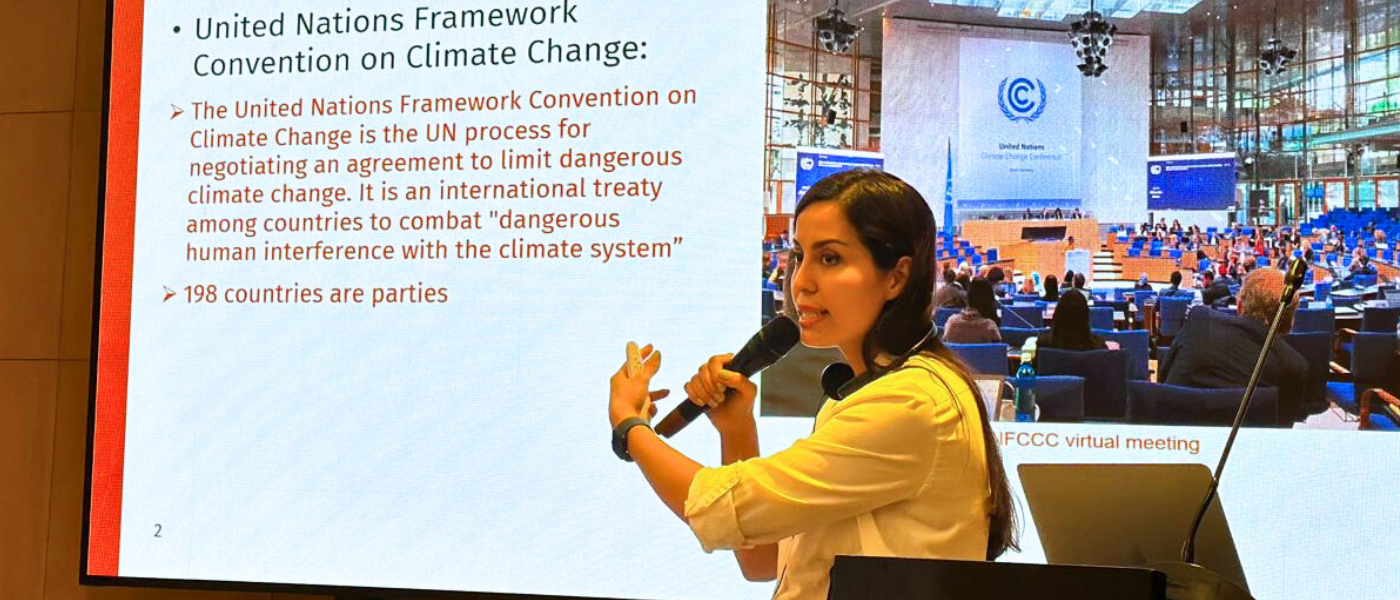 PHOTO: Zainab leads a workshop in Vientiane, presenting on climate-smart agriculture, gender-inclusive strategies, and the role of national policies in climate resilience.
PHOTO: Zainab leads a workshop in Vientiane, presenting on climate-smart agriculture, gender-inclusive strategies, and the role of national policies in climate resilience.
Climate-Smart Agriculture: A Hands-On Approach to Resilience
Since agriculture is at the heart of many rural communities in Laos, it became a natural entry point for our climate adaptation efforts. Helping farmers adopt sustainable practices was key to ensuring their livelihoods could withstand climate-related risks. In fact, one of the most rewarding aspects of my placement was leading climate-smart agriculture (CSA) training under the Women's Empowerment through Climate Action (WeAct) project. Through "training of trainers", I ensured that the technical agricultural staff from local government would work closely with farmers to explore practical solutions for climate resilience, including:
- Enhancing crop resilience by introducing drought-resistant varieties, agroforestry techniques, and conservation agriculture to improve long-term sustainability.
- Improving water management through rainwater harvesting and drip irrigation to help farmers cope with erratic rainfall.
- Strengthening soil health with organic fertilizers, crop rotation, and regenerative farming methods to maintain productivity.
- Diversifying livelihoods by training farmers to grow a variety of crops and use climate forecasting tools to make informed agricultural decisions.
By adopting these techniques, farmers gain the confidence to adapt and secure their livelihoods despite the challenges of a changing climate.
Integrating Gender into Climate Action
Climate adaptation efforts are only truly effective when they include all members of a community—especially women, who are disproportionately affected by climate change. Throughout my placement, I worked to integrate gender-sensitive approaches into resilience-building efforts.
One of the most eye-opening moments of my work was facilitating a survey among male and female participants on their perceptions of resource access and decision-making power within Lao households. The results revealed a stark contrast: while most men believed gender equity was the norm, all female respondents reported significant barriers. This sparked deeper conversations about inclusivity, and by the end of the training, male participants were more open to amplifying women’s voices in climate adaptation discussions.
This newfound awareness led to the development of gender-sensitive adaptation strategies, which were later submitted to CARE headquarters for incorporation into their broader climate action plan.
Navigating Challenges in Climate Resilience
Despite our progress, implementing climate adaptation strategies in Laos came with challenges that required creative problem-solving and collaboration. Deeply ingrained gender norms often limited women’s participation in decision-making, while logistical hurdles in rural areas made training delivery inconsistent. Additionally, a misalignment between national policies and local realities meant adaptation strategies often had to be tailored to community needs.
Even with these challenges, I saw firsthand the power of grassroots action in driving meaningful change. Integrating traditional knowledge with modern climate-resilient practices proved to be one of the most effective ways to make adaptation strategies both practical and scalable.
 PHOTO: Zainab (center) with journalists, government officials and CSO partners in Luang Prabang, where she delivered a capacity building training on "green issues" reporting.
PHOTO: Zainab (center) with journalists, government officials and CSO partners in Luang Prabang, where she delivered a capacity building training on "green issues" reporting.
Reflections and Advice for Future Volunteers
Looking back on my time in Laos, I’ve come to appreciate that impactful climate adaptation work is as much about collaboration and knowledge-sharing as it is about technical solutions. Building awareness and knowledge is fundamental to climate resilience—when people understand the purpose behind adaptation strategies, they become more invested in ensuring their long-term success.
For future VETS volunteers working in climate adaptation, I recommend focusing on two key areas. First, prioritize climate education by ensuring that everyone involved—from local farmers to policymakers—has a strong foundation in climate science and adaptation strategies. Second, build strong local networks by collaborating early with government climate experts and local NGOs to keep your work relevant and effective.
A Defining Moment: Connecting with Local Communities
Among all my experiences in Laos, the most powerful moments were those spent directly engaging with communities, listening to their lived realities, and seeing the impact of our work in action.
One particularly meaningful experience was visiting remote rural communities in northern Laos. Speaking with farmers and hearing their stories gave me a deeper understanding of the challenges they face daily. These field visits reinforced the importance of our efforts, highlighting how climate resilience is not just about policies and training—it’s about real people and the futures they are working to secure.
 PHOTO: Zainab (left) with CARE colleagues and Women's Empowerment and Climate Resilience (WECR) project participants during a coffee farm visit in Phongsaly.
PHOTO: Zainab (left) with CARE colleagues and Women's Empowerment and Climate Resilience (WECR) project participants during a coffee farm visit in Phongsaly.
As I wrapped up my time with the VETS program, I left Laos with a deep sense of gratitude—for the people I worked with, the lessons I learned, and the opportunity to contribute to meaningful climate action. The journey doesn’t end here for me; my work toward strengthening climate resilience continues.
VETS is an 8-year initiative (2020-2028) to improve the economic and social well-being of marginalized people, particularly women and girls, in 6 countries across Africa and Asia. In collaboration with local partners, the program is implemented through 190 Canadian volunteers on international assignment and is generously funded by Global Affairs Canada. Learn more.

